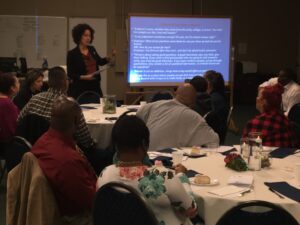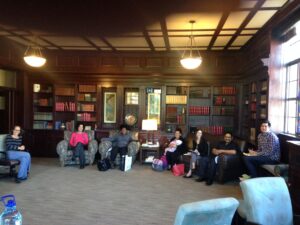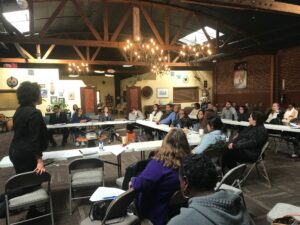Engaged Anthropology Grant: Melissa Burch

As a doctoral student at The University of Texas at Austin, Melissa Burch received a Dissertation Fieldwork Grant to facilitate research on “Navigating the Criminal Records Complex: Hiring and Job-Seeking in the Inland Empire,” supervised by Dr. João Costa Vargas. In 2017, Dr. Burch received an Engaged Anthropology Grant to support “Criminal Records and Employment Roundtables.”
Thanks to the support provided by The Wenner-Gren Foundation, I was able to return to my field site southern California’s Inland Empire in January 2018, to share the findings of my dissertation research with key collaborators and stakeholders. Framed as roundtable discussions, I presented the major findings and core arguments of my dissertation research with three audiences. The first was hosted by the Inland Empire Fair Chance Coalition, a collaborative of community-based organizations working together to challenge criminal-records based discrimination in employment. The second roundtable was hosted by the Los Angeles Regional Reentry Partnership’s employment committee, a network of nonprofit organizations advocating for formerly incarcerated people. The third roundtable was attended primarily by former prisoners and their families and hosted by the San Bernardino branch of the Center for Employment Opportunities.
Four major findings were elaborated:
1. Criminalization demotes social status through the structures of race, class and gender. This demoted status therefore does not affect everyone equally or similarly.
2. Criminal records stigma encourages criminalized people to construct and perform narratives about their convictions that reinforce dominant assumptions about criminality.
3. A growing criminal records complex increases demand for criminal background checks, facilitates their widespread availability and justifies their use.
4. Many business owners and managers employ a level-headed, non-moralistic approach to criminal records; but this openness is threatened by a political-economy increasingly characterized by regulation, competition and litigation.

As a researcher, the opportunity to share these findings with communities and organizations who had helped to generate the research questions was invaluable. Doing so helped me to concretize my findings in clear, concise and non-jargony terms and presenting in-person allowed me to collect direct feedback on my analysis, creating a mechanism for accountability to those most impacted by the research. For participants, the roundtables carved out a welcome opportunity to reflect on current strategy, dilemmas and contradictions in the day-to-day work of fighting criminal records discrimination. Together, we talked through the potential implications of the research findings and discussed various possibilities and approaches to advance social change.
In addition to the formal roundtables, this return to the field also allowed me to meet one-on-one with a number of employers, advocates and job seekers who have been important research informants. These in-depth conversations provided another means for participants to vet, contest and contribute to my findings and arguments, fostering a mutual sense of collaboration.

To my surprise, while I had imagined that most informants would want to read only an executive summary, or the parts of the dissertation most relevant to them, the vast majority requested complete copies of the dissertation and many of those read and commented on the writing. Overall, the Engaged Anthropology Grant has helped me to produce a more rigorous, relevant and collaborative dissertation and I hope, a stronger forthcoming book.